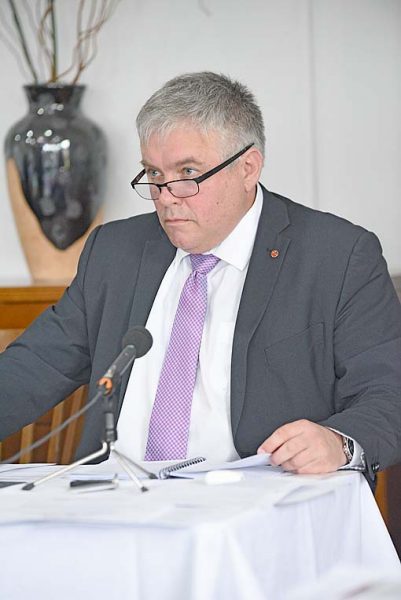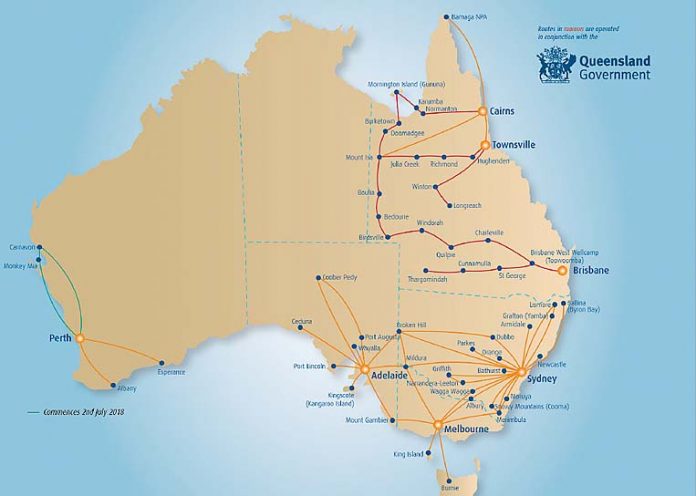
A SOUTH Australian senator has questioned whether the Mount Gambier air services route should be regulated to prevent services from being cut and ensure reliability.
Centre Alliance Senator Rex Patrick raised the issue at Tuesday’s public inquiry into regional air services in Mount Gambier.
Senator Patrick was one of a number of senators from across Australia who sits on the committee, which is putting regional and rural air services under the microscope.
More than 20 regional routes are already regulated across Australia, particularly in New South Wales, Queensland and Western Australia.
Senator Patrick has previously championed the need for a regulated route at Mount Gambier following the service cuts swept in by Regional Express.
The political figure said government intervention would guarantee a level of service to essential business, educational, medical and cultural destinations.
At this week’s public hearing, Senator Patrick used the inquiry as a platform again to raise the issue of regulating the Mount Gambier-Adelaide route.
“They use regulated routes in Queensland and Western Australia on routes that do not have high volumes, but they create a competitive environment because they (airlines) have to tender for the regulated air route for a period of time,” the senator said.
He said the Port Augusta-Adelaide route was the only regulated air route in South Australia.
The senator posed questions to local government leaders about regulating the route.
“Rex has been quite successful in winning tenders throughout the regions, which has produced pretty positive results,” Limestone Coast Local Government Association executive officer Dominic Testoni told the hearing.
“Unfortunately, in our particular case we have two routes not regulated, therefore it is pretty much open season.”
Adding to the dialogue, Senator Patrick conceded the split route would throw up some challenges for regulators.
“I can reveal I made a bit of noise about this just when Rex was cutting back services a few months ago,” the politician said.
He said his parliamentary colleague had since raised the issue with the State Government.
“They appeared to have ruled it out in a letter to him, but the letter appears not to be grounded by a lot of facts,” Senator Patrick said.
He questioned whether the local government leaders would consider regulation a possibility if the senate committee handed down a number of recommendations.
“The discussion has to start somewhere, I think everything has to be on the table,” Mr Testoni responded.
“If regulating a particular air route needs to be discussed, then it needs to be discussed.”
But he said authorities must understand the full ramifications of regulating the route.
“We need to understand what that really means,” Mr Testoni added.
He said there clearly needed to be “cooperation” between the airport operators, the State Government and the airlines.
Meanwhile, Senator Amanda Stoker also questioned whether there was a possibility of attracting a second airline to Mount Gambier.
In response, Mount Gambier Airport manager Ian Fritsch said that was “definitely” not the answer.
“We will have two airlines then with both of them not making any money,” Mr Fritsch said at the public hearing.
“If you had a market of 200,000 (passengers) you could probably look at something like that.”
He said Mount Gambier was in a unique position given the market was split into two routes – Melbourne (40pc) and Adelaide (60pc).
“It makes both markets quite small – it is not 78,000 (passengers) going one way like Whyalla or Port Lincoln, which has one destination,” Mr Fritsch said.
Responding to questions regarding Rex’s reliability operating the Mount Gambier routes, Mr Fritsch backed Rex’s track record.
“I spent 20 years working for an airline and I would say Rex are as reliable an airline as I have ever seen,” he said.
Mr Fritsch said people must realise planes “break down” and must be serviced, similar to cars.
According to Rex’s submission to the inquiry, only one route in South Australia – from Adelaide to Port Augusta – was regulated.
“Rex holds the licence to service the Adelaide to Port Augusta route three times per week, having started services on September 11, 2017, following the prior operator withdrawing services in May 2017,” the airline’s submission said.
“The regulation does not include the way in which Rex services the route.”
The carrier said it did not see “any value” derived from licensing a thin and marginal route.
In a submission from the Australian Airports Association, the industry lobby group revealed growth had been stronger on unregulated routes.
The association represents more than 260 airports and aerodromes across Australia.
“It is apparent growth has been stronger on unregulated routes where more airlines are operating than regulated routes where there is arguably less incentive to innovate and compete in terms of price and scheduling,” the association’s submission said.
“This has been one driver behind the New South Wales government’s move to deregulate.
“That said, where there is no prospect of a commercially viable service, regulation and subsidisation of routes may be an appropriate policy response.”








